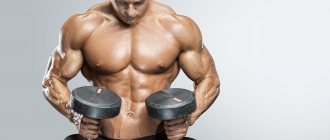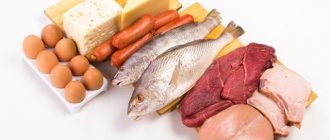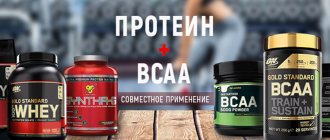- What is protein and why is it needed?
- How to use protein for weight loss?
- Protein for gaining muscle mass
- Types of protein and their differences
- Soy protein
- Whey Protein
- Casein
- Beef protein
- Vegan protein
- Multi-component protein
People who consciously choose a sports lifestyle and work out in the gym several times a week strive to achieve results faster - to pump up muscles, improve their well-being, and so on. And to achieve success, you need not only to diligently perform the exercises, but also to eat right. Therefore, fitness enthusiasts search store shelves and the Internet for the best protein. And since demand creates supply, in Russia consumers now have a choice of dozens, if not hundreds of manufacturers of protein supplements.
What is protein?
Protein or protein is one of the most important nutrients; it is necessary for high-quality growth and strengthening of muscles. Protein contains a number of amino acids that are actively involved in the synthesis of many tissues inside the human body, including the construction of muscle fibers.
Of course, people who do not engage in sports or strenuous physical labor absolutely do not need to take protein shakes. They get the required amount of protein from their usual daily diet.
People come to sports cocktails with protein if your body receives regular exercise and your goal is to lose weight or gain muscle mass. In this case, eating the usual three meals a day will not help for either goal. And, in order not to stand at the stove for days, athletes take protein shakes.
Scientists began to synthesize protein, calling it classical protein, where the composition of purified protein is ~ 80 percent. The convenience and ease of obtaining essential nutrients for an athlete’s body has created a demand for protein supplements.
Surprisingly, with the help of protein you can not only gain muscle mass, but also, as mentioned earlier, get rid of excess fat deposits. The only thing that is required to achieve maximum results is to clearly define the goal and combine taking the drug with diet and strength training.
Of course, any restrictions in the usual diet negatively affect a person’s psycho-emotional background and lead to stress. By taking protein you get rid of the feeling of hunger and don’t break down.
Let's figure out which type of sports nutrition should be preferred! Before that, let’s study what effect protein has on the body and what the rate of consumption depends on in each specific case. It is quite natural that experienced heavyweight athletes will not be suitable for supplements that are recommended for beginners, teenagers and girls.
Protein and excess weight
The calorie content of protein is the same as that of carbohydrates. One gram contains 4 kcal.
If you consume more energy in food than you expend, then over time these extra calories will be stored as fat. By and large, the body does not care from which source this excess comes from.
Another issue is that the extra calories from bodybuilding, obtained from protein, are more likely to be used to build muscles. But carbohydrates or fats in this case are easily transformed into body fat.
Why do you need protein?
It is common knowledge that protein is a nutritional supplement recommended for athletes. By eating regular foods, people “feed” the body not only with proteins, but also with fats and carbohydrates, but for athletes, proteins are the most important component.
It is quite difficult to calculate the dose of protein intake, and in order to get enough of it every day, a person would have to eat dishes prepared using a certain technology 5-6 times a day. It is obvious that such a regime is almost impossible to maintain.
This is where nutritional supplements come to the rescue: the athlete dilutes the mixture with water, drinks it, and the body is immediately supplied with the necessary substances. Thus, protein:
- saves time and money - most of the budget is spent on preparing a variety of food;
- restores the body after endured stress;
- Helps the athlete, on the one hand, with losing weight, and on the other, with building muscle mass;
- harmless - the powder contains only natural ingredients;
- reduces the load on the stomach, because the solution is absorbed more easily than solid food.
How to properly consume protein?
Of course, protein is not a fat burner in the traditional sense, so no one has yet lost weight from consuming it. It does not accelerate metabolic processes or destroy fat cells, but saturates muscle tissue with amino acids that promote its rapid recovery and growth. This begs a reasonable question: how does this substance help you lose weight? In order to answer it, it is necessary to delve into the theory.
When anyone loses weight, they lose not only subcutaneous fat, but also muscle mass. In order to not end up becoming a bony degenerator during the process of losing weight and to prevent the destruction of muscle tissue, it is necessary to provide them with a sufficient amount of protein.
Only by ensuring daily protein consumption in the amount of 2 grams per 1 kg of body weight, you can avoid muscle breakdown and stimulate the synthesis of new tissue, instead of wasted by the body for its own needs.
Thus, consuming protein allows you to lose weight without harming the health of the body and makes it possible to avoid loss of muscle mass. All professional bodybuilders recommend following a properly selected diet and regularly performing strength exercises in the gym while taking protein. Over the years of playing sports, our specialists have not met people who managed to lose weight without radically monitoring their diet and systematically performing physical exercises.
In general, summarizing the opinions of experts, it is worth highlighting the following advantages of consuming protein for weight loss:
- Most low-calorie diets for losing extra pounds do not include enough protein. In this regard, the first weight losses are associated with the destruction of muscle tissue, and not with the loss of fat. This is harmful not only for athletes who strive to maintain beautiful and strong muscles, but also for every person. With a critical decrease in the amount of protein in a person’s diet, the risks of many unpleasant diseases increase, since without amino acids the immune system cannot fully function.
- With a lack of protein, the human body shows signs of aging faster. Many deep wrinkles appear, the skin becomes dry and flabby, hair and nails become dull, brittle, and grow slowly. Men may develop erectile dysfunction, and women may experience menstrual irregularities.
- Due to the limited supply of protein to the body, in most cases, negative mental phenomena are observed. This is a constant bad mood, apathy, feelings of mental anxiety, loss of former life priorities. Such phenomena can lead to neuroses or serious mental illnesses such as depression.
- Since the natural mechanisms of fat burning in the body are triggered only with the participation of protein enzymes, this process will not take place if protein foods are excluded from the diet. Even the most exhausting diet will not help cope with fat deposits if the body does not receive enough amino acids.
- When digesting and assimilating protein foods, the body spends much more energy than processing other nutrients. The difference can reach 30 percent or more. What’s noteworthy is that this requires energy through the breakdown of fat deposits.
- By regularly consuming enough protein foods, the body triggers natural mechanisms to optimize blood glucose levels. Due to this, it is possible not only to maintain general health at a high level, but also to get rid of excessive feelings of hunger.
Consumption of increased amounts of minerals and vitamins should also be included in the diet of an athlete who is trying to “lose excess weight.” It is also necessary to count calories and maintain an energy deficit.
As you know, to lose weight it is necessary to provide favorable conditions for burning fat cells. To do this, even taking into account protein intake, you need to consume 15% more calories than the athlete will consume. This is the only way to significantly speed up the burning of fat deposits and achieve weight loss.
Using this principle, you can lose weight while on any diet. Moreover, the age and gender of a person does not matter at all. The only condition is to drink a protein shake daily between meals. There should be at least 2 such unique protein snacks during the day.
In this case, the daily calorie intake will remain unchanged, but the amount of protein consumed will increase several times. This way you can kill two birds with one stone: get rid of excess fat and prevent the destruction of muscle tissue.
Cases in which increased amounts of protein are needed
The World Health Organization (WHO) recommends the following daily protein intakes :
- For adults not engaged in heavy physical labor - 0.8 grams per 1 kg of body weight (as a rule, the figure is rounded to 1 gram)
- With regular strength loads, the norm doubles - to 1.6-1.8 grams per 1 kg of weight (rounded to 2 g)
The second point includes bodybuilding. Let's look at each of its possible goals in more detail.
When gaining muscle mass
Probably every gym goer already knows about this.
If you want to increase muscle volume, then the main condition, along with regular training, will be increased protein consumption. We have already talked about its norm - it is 2 grams per 1 kg.
The main source, that is, constituting 80-90% of the total protein, should be protein obtained from natural products. Preferably of animal origin.
If there is a shortage, you can get the rest using sports protein powder.
When losing weight
Almost every weight loss method involves following a calorie deficit diet. As a rule, the diet is limited to carbohydrates and fats, but the amount of protein is left unchanged.
If we talk about bodybuilders, then during the period of relief work the daily norm is even increased to 2.5-3 grams. This is done in order to preserve the muscle mass that is already there.
Protein for gaining muscle mass
As for gaining muscle mass with protein, everything is elementary. The process of building muscle mass mainly occurs during recovery. As a result of training, muscle fibers received stress (microtears, microtraumas). During the rest period, when a person does not train, the process of muscle recovery occurs. At the site of their tear, new fibers are synthesized.
This process occurs when the body has the resources to build new tissue. As we all know, the main resource for building muscles is protein, or scientifically called protein. Protein is the building material for muscles and muscle growth is simply impossible without a sufficient amount of protein. Although here the authors of the article allowed themselves to lie.
If you dig deeper, the protein itself consists of the amino acids BCAA, which in turn consists of the amino acids valine, leucine and isoleucine. Let's take a closer look at the properties of each amino acid:
- Leucine. Promotes a slight decrease in blood sugar levels, while enhancing the production of growth hormone. Helps accelerate the recovery of muscle tissue, skin and bones. Suppresses the breakdown of proteins and glucose. Enhances insulin production. Ensures the maintenance of the necessary water balance in the body.
- Isoleucine. Helps reproduce hemoglobin. Increases the athlete's endurance and restores damaged muscle tissue. Increases stress resistance. Disintegrates in muscle tissue releasing energy. Balances blood sugar levels.
- Valin. Needed to restore muscle tissue and more. Accelerates the healing of microdamages. Positively affects the nitrogen balance of the body.
The body needs them during the recovery period. Not forgetting, of course, about the transport elements that provide energy - carbohydrates, complex in the general diet and fast, for example, a banana, in order to quickly replenish energy reserves right before an increased load. How to take protein to gain muscle mass is written on the packaging of your protein. But on average, protein is taken in the morning, after training, and before bed. Also, if you don't have the opportunity to eat during the day, a protein shake will be a great snack option. But remember, sports supplements should not exceed 40-50% of your total daily diet.
Naturally, the athlete’s body requires increased replenishment of vitamins, minerals, and healthy fats. Only by maintaining the balance of all substances and maintaining a calorie surplus at the proper level will an athlete be able to gain weight. Calorie surplus? An athlete must consume more calories every day than he expends, otherwise where will the energy come from to build muscles?
Several types of protein were mentioned above. It's time to look at all types of protein so that readers can decide on the choice of a sports supplement.
Protein effect
The use of protein has become widespread not only in bodybuilding, but also in other sports.
Scientific studies have shown the high effectiveness of this supplement. Namely:
- Accelerating the body's recovery after strength training. Protein has a positive effect on ultra-urgent (recovery during training), urgent (recovery within several hours after training) and long-term recovery (from a day or more).
Accelerated recovery provokes faster rates of muscle growth.
- Taking protein accelerates the growth of muscle strength. The fact is that power loads deplete the reserves of protein structures in the muscle cell. Additional protein intake speeds up recovery. As a result, strength grows faster.
- Protein is used when working on relief. Here, the main function of the supplement is to preserve muscle mass in conditions of calorie deficit.
Types of protein and their differences
- Casein protein. Contains all types of amino acids that the human body cannot do without. It perfectly supplies muscle tissue with energy and plastic material, helps preserve muscles during dieting, and resists their destruction. The most important feature of casein for weight loss is that it suppresses appetite better than all other products, and at the same time does not cause any harm to the body. During the period of gaining muscle mass, use casein protein at night so that it nourishes the body most of the night.
- Whey Protein. It has high biological value and is a leader in the content of essential amino acids of the BCAA group. Compared to casein, it is quickly absorbed, metabolic processes are significantly accelerated, the body's energy needs increase, due to which rapid fat burning occurs. An important property is that it is more effective as an anabolic product than other types of protein supplements - it serves as a fast protein to prevent catabolism.
- Soy protein. A natural product of plant origin, which has a mild, delicate effect on the body. It is perfect for those who have allergic reactions to proteins of animal origin, and will also be a real godsend for vegetarians, because their diet cannot contain such valuable natural protein products as fish, meat, and cheese. The sports supplement also has anabolic and fat-burning properties and does an excellent job of improving immunity.
- Beef protein. An expensive type of squirrel. The main feature is the presence of an increased amount of creatine in the composition, which maintains the level of cell division at the desired level. Beef protein differs from whey protein in the absence of lactose and other carbohydrates. High absorption rate and rich composition of amino acids.
- Egg white. The speed of absorption is inferior to casein. However, it has an increased number of amino acids in its composition due to protein of animal origin.
- Vegan protein. A combined, plant-based product consisting of many proteins. They mainly combine pea, soy and rice protein, thereby creating a perfectly balanced product for vegetarian athletes.
- Complex protein. Same meaning as vegan. Sports nutrition brands combine animal proteins to create nutrient-dense products.
Let's move on to a detailed consideration of the types of protein for various tasks. To understand which protein is the best in your particular case.
WHAT IS THE BEST SOURCE OF PROTEIN?
It is known that protein can be complete and incomplete. The first includes nine essential amino acids that our body, unfortunately, cannot create. These are meat, poultry, fish, dairy products, eggs.
There are a number of methods for assessing it, in particular by its biological value (BV) and by the coefficient of amino acid digestibility (PDCAAS). The latter is the most optimal from the FDA's point of view. According to PDCAAS, whey protein, cottage cheese, egg white and soy protein fall into the first category. However, greater benefits from protein can be achieved by including a variety of protein sources in your diet, including plant-based ones.
Dairy proteins, meat, poultry, fish, egg whites and soy are considered the highest quality, as they contain essential amino acids necessary for the restoration and growth of body tissues.
Soy protein
For those athletes looking for affordable natural nutritional supplements, it is worth paying attention to the composition of soy protein. It does not contain any animal products, so it is perfect for vegetarians who want to achieve maximum results from their sports training.
If earlier soy sports supplements contained harmful components that worsened digestion and negatively affected the absorption of nutrients in the gastrointestinal tract, now proteins are produced purified, with a high concentration of valuable amino acids. The biological value of soy protein composition has an average value of 74.
Main components and characteristics of soy protein
The amino acid composition of soy protein is characterized by the following features:
- Low methionine content. Manufacturers compensate for the lack of this amino acid in the soy protein complex by adding it to the supplement, due to which excellent muscle growth, immune strengthening, and antioxidant properties are observed when consuming soy protein.
- Low BCAA levels. It is worth noting that, despite the increased attention to the essential amino acids of this group, the human body cannot absorb them in unlimited quantities. Therefore, to increase muscle volume during training and prevent catabolism, in most cases, the amino acids contained in soy protein and food are sufficient.
- Antinutrients. The substances have the properties of disrupting optimal protein digestion and stopping the absorption of nutrients. If the amount of them in soy itself is quite large, then in the composition of the additive developed by professionals there are either none of them at all, or there is a tiny amount that does not have a negative effect on the body. Before protein is extracted from soy, it is thoroughly purified to remove protease inhibitors and lectins.
- A large number of phytoesterogens. The doses of soy protein recommended for use as a sports supplement contain the optimal amount of isoflavones. A decrease in testosterone levels and an increase in the amount of female hormones, which athletes are afraid of, is not observed, since isoflavones are similar to esterogens, but do not function in the same way. The effect of phytoesterogens on the athlete’s body is very beneficial - it prevents gynecomastia, cardiovascular diseases, cancer, prostatitis, and has an anti-inflammatory effect.
- A large amount of glutamine in the composition. In terms of the content of this amino acid, soy protein is superior to sports supplements of animal origin. The amino acid serves as the main component for building muscle, so when taking this supplement, positive results are observed - muscle volume increases, they become stronger. The substance also does an excellent job of anti-catabolic function, helps quickly recover after workouts and improves immunity.
- Contains an increased amount of lysine. Serves as a powerful tool for strengthening the immune system, supports the health of the heart and blood vessels, and accelerates tissue regeneration. In addition, lysine has excellent energy properties, so after long workouts it helps to feel a great surge of strength, which is important for good health.
- Does not contain lactose. This is a huge advantage that makes soy protein different from casein and whey protein. Thanks to this, it is well absorbed, making it suitable for athletes who cannot tolerate dairy products.
Pros and cons of soy protein
The only product from which soy protein is made is natural, environmentally friendly soybeans. During the production of a sports supplement, raw materials undergo multi-stage processing. It includes separating water from the plant, turning it into powder form, separating harmful antinutrients, fats, carbohydrates, squeezing concentrated protein, enriching the composition with methionine, flavorings and additives, and safe preservatives.
A complex technological process allows us to produce a high-quality and safe food additive, which will be characterized by the following objective advantages:
- Easy to digest.
- Pleasant taste and aroma.
- Effective effect on the growth of muscle mass and strength;
- Strengthening the immune system.
- Improved metabolism.
- Optimization of the general condition of the body.
- Positive effect on the recovery of the body after training.
- No side effects.
- Improving thyroid function.
The downside will be the incomplete BCAA chain in the structure of soy protein.
The benefit of soy protein supplements is that they contain a small amount of fiber. Thanks to this compositional feature, the product perfectly suppresses appetite, improves digestion, and also serves as an excellent natural absorbent.
Athletes who prefer soy protein burn subcutaneous fat faster, reduce the risk of gallstones, develop cancer less often, almost never have constipation, and have well-functioning intestinal motility.
Whey Protein
Whey protein is characterized by high manufacturing standards and contains the entire complex of amino acids essential for the human body. The protein norm is an individual indicator; most often it varies depending on age, weight category, gender, degree of activity during the day and other factors.
Whey protein is a valuable source of basic amino acids BCAA, which are classified as essential. During active exercise and strength training, it is extremely important for our body to receive large amounts of these amino acids. Low levels of BCAAs in the body lead to signs of fatigue, decreased activity and slower metabolic processes.
Whey protein is suitable for the following categories:
- people following a special low-carbohydrate diet (whey protein contains a minimum of cholesterol);
- women during pregnancy and lactation;
- vegetarians who consume milk;
- persons with lactose allergies;
- people with gluten allergies;
- persons with digestive problems (whey protein is absorbed by the body as quickly and easily as possible).
There are 2 types of whey protein in sports nutrition:
- Whey protein concentrate, which contains up to 80% protein (depending on product and brand). It has a reduced amount of carbohydrates.
- Whey protein isolate. The most purified protein, more than 90% protein in the composition. The low level of carbohydrates and fats puts this protein in a worthy position in the choice of sports nutrition. For this reason, it is considered one of the most expensive products.
How to Choose a Protein Based on its Protein Source
To gain muscle mass or dry muscles (the process of reducing fat mass while maintaining muscle volume), protein supplements are used, varying in the source of protein. Athletes use whey, egg, soy isolate, casein and complex protein.
Whey Protein
It is considered the best in terms of the value of its biological composition. It is a protein obtained from the whey produced during cheese making. Its composition is quite rich: vitamins A, B2, PP, organic acids, minerals - iron, iodine, phosphorus.
According to the degree of purification and method of production, it is divided into types:
- Concentrate is a popular product among bodybuilders. Not the cleanest, but not the most expensive either. Contains 80% protein and 20% other nutrients and vitamins. Dry whey helps quickly build muscle mass, removes toxins and excess fluid from the body. The concentrate is taken daily after training, but it is not recommended for drying muscles. Satisfies hunger, indispensable for those who adhere to a diet. Easily diluted with water and convenient to use.
- Isolate is whey protein without carbohydrates and fats, does not contain lactose, almost pure protein. Quickly reduces weight, approved for drying. It is supplemented with amino acids and vitamins.
- Hydrolyzate is an expensive whey protein that is partially fermented by pancreatin. A pure, easily digestible product, its breakdown speed is a maximum of 30 minutes. It sharply increases insulin in the blood and is more suitable for weight gain than for weight loss.
Egg white concentrate is difficult to find; few manufacturers produce it. Like whey, it contains a minimal amount of sugar and fat and quickly builds muscle mass.
Soy protein
Soy isolate contains 92% protein on a dry weight basis. Very popular among bodybuilding professionals. The price of the supplement is low, but the growth rate of muscle mass is also small.
It is believed that soy protein has an effect on the body's hormonal levels - it reduces the secretion of testosterone and increases the secretion of estrogen (the female sex hormone), which leads to the growth of female breasts in men, the accumulation of fat in the abdomen and thighs. But this issue still causes controversy and disagreement.
Casein protein
Once in the stomach, casein forms a curdled clot. Its main functions:
- slows down the process of protein digestion;
- suppresses appetite;
- nourishes muscle tissue with amino acids for a long time.
Since casein slows down the breakdown of protein, it is not enough to gain muscle mass. It is recommended to take “fast” protein separately, for example, whey.
Complete protein
This type of protein is created on the basis of natural components (extracts, amino acids, vitamins). It activates metabolic processes in the body during exercise, but it does not have any special benefits.
+ 109.88 bonus rubles
Optimum Nutrition100% Whey Gold Standard 2270 gWhey protein5,494 rub.
+ 36.82 bonus rubles
OptiMealCasein Source 900 g Casein RUR 1,841
+ 66.44 bonus rubles
BSNSyntha-6 1320 gProtein complex RUR 3,322
+ 29.7 bonus rubles
BombBarWhey Protein 900 gWhey proteinRUR 1,485
Casein protein
Casein protein is the longest-absorbing protein drink in the body. Ideal for gaining muscle mass (taken at night) and suppressing appetite during weight loss, casein will fuel your body for a long time. After taking it for six to eight hours, building materials will gradually enter the body.
Features of consuming casein protein
In the daily diet of any athlete, the main component of any meal is the anti-catabolic effect. That is, when losing weight, we try to preserve muscles and relief as much as possible. At the same time, focusing on the fat layer. And when gaining muscle mass, gain the maximum amount of necessary elements that will help increase the level of muscle, and not unnecessary fat. Therefore, taking casein for weight loss and weight gain will be different.
- Regardless of your goals, casein protein is not recommended to be taken before or after a workout. Since during these windows the body initially needs a sufficient amount of energy and resources to perform physical exercises and to quickly saturate after using them up.
- Casein protein for weight loss is recommended to be taken two to four times, 20-30 grams between meals and immediately before bed.
- To gain muscle mass, protein is also consumed at night. During the day, for this purpose, use other types of protein and sports supplements, for example, the same gainer.
Protein varieties
There are a large number of varieties of protein depending on the raw materials used and production technology:
- Whey concentrate. The most popular type of sports nutrition, which is made from whey. It is inexpensive, but may contain lactose and fats. It is quite rare in its pure form, so it is suitable for gaining muscle mass, not losing weight.
- Casein. This type of sports nutrition is absorbed within 6-7 hours and is suitable as a food replacement. It is recommended to take it before bed to build muscle mass and get rid of night hunger.
- Hydrolyzate. This is the highest quality type of sports nutrition. It contains purified protein that does not harm the digestive system. It is characterized by high cost. Made from beef or whey.
- Isolates. Refers to quickly digestible food. Ideal for weight loss as it contains little or no fat and carbohydrates. It is characterized by high cost.
- Soy protein. Suitable for vegetarians as it is made from plant ingredients. Contains glutamine, arginine and a number of amino acids.
- Egg white. Contains a small amount of carbohydrates with a high content of amino acids.
- Milk protein isolate. A quality product that combines the properties of casein and whey protein. It is characterized by low protein content.
Beef protein
As stated earlier. The main feature of beef protein is the presence of creatine in its composition. Meat protein has increased biological value: all components of the drink are absorbed in thirty minutes. To summarize all the information, beef protein shake:
- Increases the time during which nitrogen remains in positive amounts in muscle tissue;
- Accelerates the recovery of muscle fibers;
- Prevents catabolism;
- Does not contain lactose;
- It has its own unique taste.
Of the minuses of beef protein, two points stand out. This is the cost of the product; this type of protein is somewhat more expensive than its species counterparts. Foams when stirred in a shaker. The athlete will have to wait a couple of minutes until the foam settles.
Vegan protein
Vegan or plant-based protein is an ideal option for those athletes who have given up eating meat and animal products in their diet. Sports protein drinks in this category typically consist of:
- Soy;
- Peas;
- Rice;
- Hemp seeds;
- Pumpkin seeds;
- Sunflower seeds;
- Chia Seeds;
- Semyan Inka-Ichi
Manufacturers combine various sources of protein in the composition, resulting in a complex plant-based drink that will not be inferior to animal protein. Moreover, if we take into account modern Swiss and German studies, which have proven the equivalence of animal and vegetable protein.
Why is protein popular?
Firstly, it is an excellent source of protein, in turn, protein is the building material for muscles in our body. And what if not muscles is needed by an athlete who is interested in them? Is it true?
Secondly, some types of proteins include amino acids that help restore the body after training.
Thirdly, this, of course, is convenience, because time often does not allow you to eat properly and follow a complete regime, which is why athletes often replace meals with a protein shake.
Multi-component protein
Multi-ingredient protein is one of the favorite protein drinks. That's because it, like vegan, consists of several types of protein. Vitamins and amino acids, food enzymes and sports supplements such as arginine, creatine, L-carnitine, beta-alanine and others are often added to such drinks.
Basically, sports nutrition manufacturers combine whey, casein and egg proteins. Due to the different speed of absorption, the body receives protein for a long time (up to 8 hours), but due to the whey protein in the composition, saturation with nutrients starts in 15-20 minutes.











